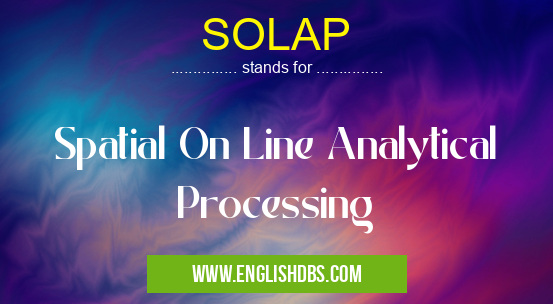What does SOLAP mean in UNCLASSIFIED
SOLAP (Spatial On Line Analytical Processing) is a powerful technology that combines the capabilities of online analytical processing (OLAP) with spatial data. It enables users to analyze and visualize data that has a geographic component, such as sales figures by region or customer demographics by zip code.

SOLAP meaning in Unclassified in Miscellaneous
SOLAP mostly used in an acronym Unclassified in Category Miscellaneous that means Spatial On Line Analytical Processing
Shorthand: SOLAP,
Full Form: Spatial On Line Analytical Processing
For more information of "Spatial On Line Analytical Processing", see the section below.
Key Features of SOLAP
- Multidimensional Analysis: SOLAP allows users to analyze data from multiple dimensions, such as time, location, and product category.
- Spatial Analysis: SOLAP provides a range of spatial analysis functions, such as buffering, overlaying, and distance calculations.
- Interactive Visualization: SOLAP tools typically include interactive maps and charts that enable users to visualize and explore data in a user-friendly way.
Benefits of SOLAP
- Improved Decision-Making: SOLAP helps businesses make better decisions by providing insights into the spatial distribution of data.
- Enhanced Customer Segmentation: SOLAP enables businesses to segment customers based on their geographic location, demographics, and spending patterns.
- Optimized Resource Allocation: SOLAP assists businesses in optimizing the allocation of resources, such as marketing campaigns and store locations, by identifying areas with the highest potential.
Essential Questions and Answers on Spatial On Line Analytical Processing in "MISCELLANEOUS»UNFILED"
What is SOLAP?
SOLAP (Spatial On Line Analytical Processing) is a data processing technique that combines spatial data with OLAP (Online Analytical Processing) to analyze and visualize spatial data. It allows users to explore and interact with spatial data in multiple dimensions, such as location, time, and other attributes.
What are the benefits of using SOLAP?
SOLAP provides several benefits, including:
- Enhanced data analysis and visualization: It allows users to analyze spatial data from different perspectives and identify patterns and relationships that may not be apparent from traditional methods.
What are the applications of SOLAP?
SOLAP is widely used in various industries and applications, such as:
- Business intelligence and decision-making: It helps businesses analyze market trends, customer demographics, and other spatial data to make informed decisions.
What are the key features of SOLAP?
SOLAP systems typically include the following features:
- Data cube technology: This allows for efficient storage and retrieval of multidimensional data.
What are the limitations of SOLAP?
SOLAP may have certain limitations, such as:
- Data volume: SOLAP systems may not be suitable for handling extremely large datasets.
Final Words: SOLAP is a valuable tool for businesses that need to analyze and visualize data with a geographic component. It provides powerful capabilities for multidimensional analysis, spatial analysis, and interactive visualization. By leveraging SOLAP, businesses can gain deeper insights into their data and make more informed decisions.
